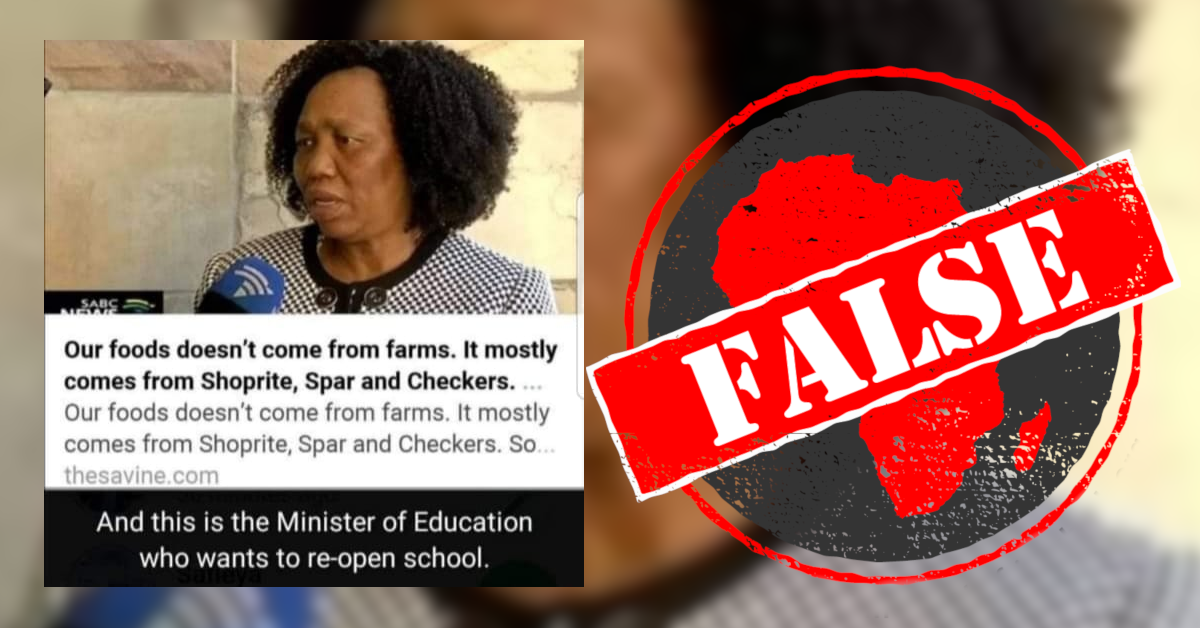A graphic shared widely on Facebook in South Africa claims that the “education minister” has said that “our foods doesn’t come from farms”, but instead from local supermarkets Shoprite, Spar and Checkers.
The graphic shows the quote underneath a photo of the country’s minister for basic education, Angie Motshekga, and the comment “And this is the Minister of Education who wants to re-open school”. The graphic was shared on 5 May 2020.
Primary and secondary schools in South Africa, for whom the Ministry of Basic Education is responsible, have been closed since 18 March. This is in line with a country-wide lockdown to stop the spread of Covid-19.
Has a government minister really made such startling remarks about where food comes from? And is she planning to reopen schools? We checked.

On 14 May, the basic education department issued a statement that provincial heads of education would reconvene on 18 May to finalise when schools would be reopened. The minister would brief the media after the meeting.
When the graphic was shared on Facebook, and at time of writing, dates had not been announced for when South African schools would reopen.
A reverse image search for the photo of Motshekga used in the graphic led us both to the original photo, from 2018, and the origin for this graphic.
The same photo was used in a 1 May article published by SA Vine, which describes itself as “a satirical newspaper and website”. The headline of the article is: “Our foods doesn’t come from farms. It mostly comes from Shoprite, Spar and Checkers. So we are OK for now.”
SA Vine displays “Dependent. Unreliable. Satire” on every page. And a note at the bottom of this article says “the above is a satire article” – it is made up and meant to be funny.
Satire may be defined as “the use of humour or exaggeration in order to show how foolish or wicked some people's behaviour or ideas are”. Satire can’t be fact-checked, because it isn’t presented as fact.
While the short satirical article uses Motshekga’s photo, it doesn’t mention her by name. It only says “the government” has said “the food we eat in South Africa does not come from farms. It comes from Spar, Shoprite and Checkers”.
But the graphic circulating on Facebook isn’t presented as satire. It is being shared as though it is fact. When satire is reused as fact, as real news, it becomes disinformation.
The graphic is false: the minister of basic education said nothing of the sort. – Africa Check
The graphic shows the quote underneath a photo of the country’s minister for basic education, Angie Motshekga, and the comment “And this is the Minister of Education who wants to re-open school”. The graphic was shared on 5 May 2020.
Primary and secondary schools in South Africa, for whom the Ministry of Basic Education is responsible, have been closed since 18 March. This is in line with a country-wide lockdown to stop the spread of Covid-19.
Has a government minister really made such startling remarks about where food comes from? And is she planning to reopen schools? We checked.

No plans announced yet for going back to school
On 14 May, the basic education department issued a statement that provincial heads of education would reconvene on 18 May to finalise when schools would be reopened. The minister would brief the media after the meeting.
When the graphic was shared on Facebook, and at time of writing, dates had not been announced for when South African schools would reopen.
Story originates on ‘satire’ website
A reverse image search for the photo of Motshekga used in the graphic led us both to the original photo, from 2018, and the origin for this graphic.
The same photo was used in a 1 May article published by SA Vine, which describes itself as “a satirical newspaper and website”. The headline of the article is: “Our foods doesn’t come from farms. It mostly comes from Shoprite, Spar and Checkers. So we are OK for now.”
SA Vine displays “Dependent. Unreliable. Satire” on every page. And a note at the bottom of this article says “the above is a satire article” – it is made up and meant to be funny.
Satire may be defined as “the use of humour or exaggeration in order to show how foolish or wicked some people's behaviour or ideas are”. Satire can’t be fact-checked, because it isn’t presented as fact.
While the short satirical article uses Motshekga’s photo, it doesn’t mention her by name. It only says “the government” has said “the food we eat in South Africa does not come from farms. It comes from Spar, Shoprite and Checkers”.
But the graphic circulating on Facebook isn’t presented as satire. It is being shared as though it is fact. When satire is reused as fact, as real news, it becomes disinformation.
The graphic is false: the minister of basic education said nothing of the sort. – Africa Check
Republish our content for free
For publishers: what to do if your post is rated false
A fact-checker has rated your Facebook or Instagram post as “false”, “altered”, “partly false” or “missing context”. This could have serious consequences. What do you do?
Click on our guide for the steps you should follow.
Publishers guideAfrica Check teams up with Facebook
Africa Check is a partner in Meta's third-party fact-checking programme to help stop the spread of false information on social media.
The content we rate as “false” will be downgraded on Facebook and Instagram. This means fewer people will see it.
You can also help identify false information on Facebook. This guide explains how.


Add new comment